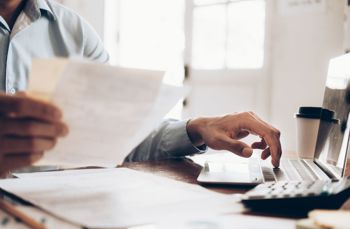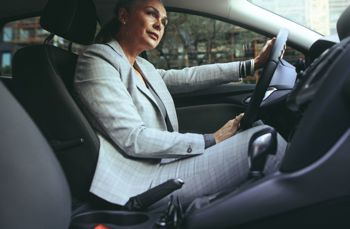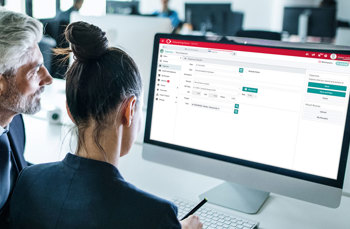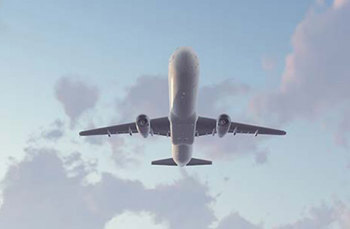10 tips to help you manage VAT and expenses
VAT and expenses aren’t usually very high on the reasons why people came into the finance industry and so anything that can help with what can often seem like an unexciting part of our day has got to be positive.
Just because it isn’t glamourous doesn’t mean that managing your expenses and VAT is unimportant. After all, getting your VAT return wrong can often lead to a penalty and interest being applied to the unpaid tax.
It can often be the case that when selected for a visit, companies find staff expenses is the first thing that the VAT inspector checks.
In this post, we’ll give you 10 tips to help manage your expenses and make sure that your VAT is right.
Tip #1 - Use technology to take the strain
Using a well set up and configured system, like Access Financials, to effectively manage your expenses is the smartest move you can make.
With the right configuration in place, you can save time in so many areas, including:
- Data entry
- VAT classification
- Reporting
- Payment
If you are using a manual system then think about making the switch, you’ll be delighted with how efficient your expense process becomes.
Tip #2 – Make sure your coding is correct
Are you using the coding of expenses correctly?
You’ll need to make sure that you are coding to a standard and reduced rate naturally. Additionally, you should also make sure you understand the difference between zero-rated and exempt. It’s always a good idea to have ‘not registered for VAT’ and ‘overseas’ codes too.
When completing your VAT return, it's important to consider these categories — especially if you need to apply reverse charge VAT to overseas costs.
Tip #3 – Make sure your bookkeeping is up to scratch
Clear, accurate, and timely record keeping is a fundamental must when managing VAT on expenses.
There are often so many different payments being made and receipts and invoices flying around that it is easy to allow things to get out of hand.
The bedrock of well-managed expenses and VAT system is great record keeping.
Tip #4 - Save your evidence
Although HMRC says that you don’t need to keep receipts for PAYE purposes, you still need to show that you are operating the rules correctly. Our advice is to make sure you have documentary evidence to show why you applied the rules as you did.
The best expenses systems will allow you to save an image of a receipt so you don’t need to have bulky and inefficient filing systems as you can do it all in the cloud.
Tip #5 – Make sure you have a clear and well thought out policy
This is vital for every well-run company.
Having an expenses policy is a must as it will let employees know what they can and can’t claim. It will also detail limits for things such as hotel rooms and subsistence.
Make sure though that it is in clear and easy-to-read language. Steer away from using any jargon that you may have gleaned from the HMRC website. Try to include real-life examples to illustrate your points.
And of course, you must make sure that your policy doesn’t conflict with any VAT or PAYE rules around payments to employees.
Tip #6 – Make sure that you effectively communicate your policies
If you want staff to comply with the policy then they need to know about it!
Making sure you effectively communicate your policy, perhaps in their induction programme and then by issuing updates when things change helps enormously with compliance.
Keep the policy in an easy-to-find place, too, such as a SharePoint location or a main drive folder so that people can refer to it easily and quickly.
Tip #7 – Have a regular review process
Once you have all of your policies and procedures in place then it is easy to breathe a huge sigh of relief and think that your work is done.
But unfortunately, VAT law is constantly changing and you need to make sure you keep abreast of the latest rules.
Read the VAT notices issued by HMRC (you should automatically get them as a VAT-registered business) and amend your systems and processes accordingly.
It’s not enough to hope that you catch things through the updates though. Make sure you also schedule a VAT compliance review every 12 months. Better safe than sorry!
Tip #8 – Document your thought process
One of the features of the VAT penalty system is that the value of the penalty is larger if you have been careless or dishonest.
If you made a mistake in handling VAT on expenses, you might still avoid a penalty by demonstrating that you made a reasonable decision, even if the outcome was incorrect. It's similar to showing your work to explain your reasoning.
Keep a record of your decisions, and the reasoning behind them, and add links to HMRC documentation that backs up your thought process. This will prove that you were taking care and trying to do the right thing.
Tip #9 – Don’t forget to add VAT to expenses that you recharge
This is an area that often trips people up. Very simply, you charge VAT to your customers on expenses that you are recharging where you incurred them as part of providing a service to them.
Disbursements, where you make a payment on behalf of a client, do not attract VAT and this is where the confusion arises.
As an example, if you pay for some market research on your client’s product and pass that on to them then this is a disbursement. If you read the report and use it to make suggestions to help your client market their product then this is an expense and is VATable.
And if it is an expense then it is VATable, even if you didn’t pay VAT on it in the first place as it now forms part of your service rather than being the original thing that you paid for.
Tip #10 – If you are not sure then ask for help
Although it can be difficult sometimes to get through to HMRC, it is always worth persisting to get an answer to something you are not sure about.
Often when you are too close to a problem, it can be difficult to see the wood for the trees, and talking it through with someone does help.
If you do get advice from the VAT helpline, then we’d always suggest that you document the call by noting who you spoke to, what department they are in, and when you called. You'll find this useful in case there is any query later on.
Effortlessly manage VAT on Expenses
Managing VAT on your expenses doesn’t have to be a trial. If you have clear and well-thought-out systems and you regularly review your compliance then you will be ahead of the game.
Simple things like great recordkeeping and making sure you evidence your decision-making process mean that you are less likely to suffer any penalties. And, of course, leveraging technology to do most of the legwork for you is a massive time saver.
We hope you have found our tips useful and if you’d like to talk to us about updating your expenses system then why not give us a call or use our live chat at the bottom of your screen.
Looking for more advice on VAT on expenses?
We've got many articles and three in-depth guides for you to use when mastering VAT on expenses.
VAT on expenses guides
Handy guides for you to download and keep in your back pocket.

The ultimate guide to VAT on expenses
Master the basics of VAT on expenses and be confident in what you can claim for with this guide.

The 7 step guide to getting compliant
Ensuring you get, and stay, VAT compliant with Expenses can seem like a mammoth task. With our step by step guide, you can be confident you're not missing a thing.

The guide for what you could be missing
Whether you're a VAT veteran or a VAT virgin, VAT on expenses can still be a subject that gives accountants sleepless nights. This guide walks you through all of those commonly missed items in one download.
VAT on expenses information and advice

The basics of subsistence and VAT
Go to article
Why Jaffa Cakes have an important role to play in Expenses and VAT
Go to article
Mileage allowance and VAT
Go to article
Rules on expenses and VAT when staying away from home on business
Go to article
Features of a great expense management system
Go to article
VAT on staff business travel
Go to article
Should you add VAT to expenses your customers will be paying?
Go to article
Writing your expenses policy - the things to think about
Go to article

 AU & NZ
AU & NZ
 SG
SG
 MY
MY
 US
US
 IE
IE